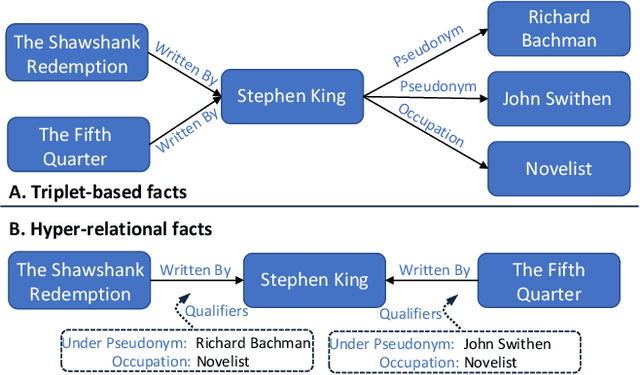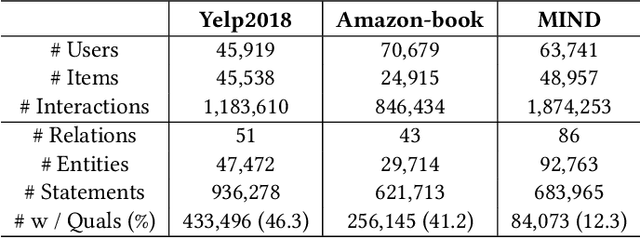Hongrui Xuan
Self-Supervised Dynamic Hypergraph Recommendation based on Hyper-Relational Knowledge Graph
Aug 15, 2023



Abstract:Knowledge graphs (KGs) are commonly used as side information to enhance collaborative signals and improve recommendation quality. In the context of knowledge-aware recommendation (KGR), graph neural networks (GNNs) have emerged as promising solutions for modeling factual and semantic information in KGs. However, the long-tail distribution of entities leads to sparsity in supervision signals, which weakens the quality of item representation when utilizing KG enhancement. Additionally, the binary relation representation of KGs simplifies hyper-relational facts, making it challenging to model complex real-world information. Furthermore, the over-smoothing phenomenon results in indistinguishable representations and information loss. To address these challenges, we propose the SDK (Self-Supervised Dynamic Hypergraph Recommendation based on Hyper-Relational Knowledge Graph) framework. This framework establishes a cross-view hypergraph self-supervised learning mechanism for KG enhancement. Specifically, we model hyper-relational facts in KGs to capture interdependencies between entities under complete semantic conditions. With the refined representation, a hypergraph is dynamically constructed to preserve features in the deep vector space, thereby alleviating the over-smoothing problem. Furthermore, we mine external supervision signals from both the global perspective of the hypergraph and the local perspective of collaborative filtering (CF) to guide the model prediction process. Extensive experiments conducted on different datasets demonstrate the superiority of the SDK framework over state-of-the-art models. The results showcase its ability to alleviate the effects of over-smoothing and supervision signal sparsity.
Knowledge Enhancement for Multi-Behavior Contrastive Recommendation
Jan 13, 2023



Abstract:A well-designed recommender system can accurately capture the attributes of users and items, reflecting the unique preferences of individuals. Traditional recommendation techniques usually focus on modeling the singular type of behaviors between users and items. However, in many practical recommendation scenarios (e.g., social media, e-commerce), there exist multi-typed interactive behaviors in user-item relationships, such as click, tag-as-favorite, and purchase in online shopping platforms. Thus, how to make full use of multi-behavior information for recommendation is of great importance to the existing system, which presents challenges in two aspects that need to be explored: (1) Utilizing users' personalized preferences to capture multi-behavioral dependencies; (2) Dealing with the insufficient recommendation caused by sparse supervision signal for target behavior. In this work, we propose a Knowledge Enhancement Multi-Behavior Contrastive Learning Recommendation (KMCLR) framework, including two Contrastive Learning tasks and three functional modules to tackle the above challenges, respectively. In particular, we design the multi-behavior learning module to extract users' personalized behavior information for user-embedding enhancement, and utilize knowledge graph in the knowledge enhancement module to derive more robust knowledge-aware representations for items. In addition, in the optimization stage, we model the coarse-grained commonalities and the fine-grained differences between multi-behavior of users to further improve the recommendation effect. Extensive experiments and ablation tests on the three real-world datasets indicate our KMCLR outperforms various state-of-the-art recommendation methods and verify the effectiveness of our method.
 Add to Chrome
Add to Chrome Add to Firefox
Add to Firefox Add to Edge
Add to Edge